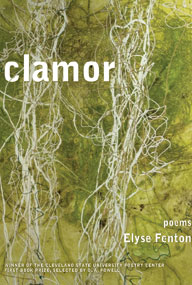
|
“My curse or gift is blindness,” says the speaker of Clamor: “I've never read this story before.” Other perceptual deficits abound. From the collection's title poem: The deafening metal of my hammer strikes What arises—or, rather, what the poet conjures up, in spite of these impediments—is a war-torn landscape culled from the site not of the actual battles, but their aftershocks, their dreamscapes, and the burden of grief. This speaker weighs with a precision at times frightening the “price[s] for having survived.” Unifying formal and thematic features, despite the precariousness of the backdrop, act, here, as ballast, such as the speaker’s affinity with the “slaty loam” of the earth (“I scrape weedy belts from the green/ waists of spinach and kale . . . “; “I loosen sod . . . listen for the twang of the spade-head/ channeling the chthonic ground”) and her insistence on the primacy of the name. Poems as varied as “What We Hold, We Hold at Bay,” “Veteran's Day,” and “Roll Call,” recall nomina sint numina—the belief that the essence of a thing is present in its name. The speaker of these poems oft returns to the “sweat-salt metal of your un-/answered name” as if willing back the fusion of the sign and the referent, of the thing and the name. Clamor, in one sense, could be read as an elegy to the wresting apart—and sustained separation—between the two, as a result of trauma. “I have to believe in more than signifiers,” the speaker of “Love in Wartime (I)” declares: “the world cannot be dismantled/ by the word alone.” The soldier with whom the speaker is in communication is a member of the “Hopeless Returned,” a “Civilian at last”—delivered from war, but not necessarily to peace. It's both beautiful and terrible, this dialogue between the indivisibility and subsequent rupture within the self—and, writ large, history. From “Conversation”: “No one marries during war,/ I'm told, and yet I'm married to the thought/ of you returning home to marry me/ to my former self. The war is everywhere/ at once.” Clamor is a meditation on loyalty—not necessarily to language or the world, nor even to a person and what he or she has survived—but to the responsibility of making the impossible possible, through the reclamation of the power of vision, and, thus, dreams. “Forgive me, love, this last// infidelity: I never dreamed you whole.” Also by Virginia Konchan: |
